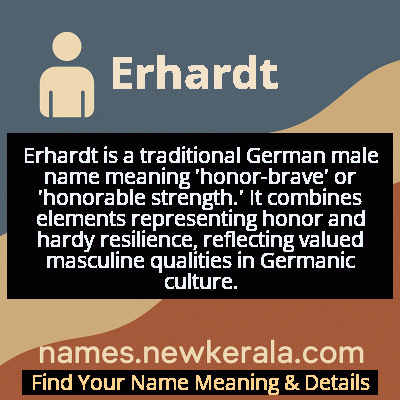Erhardt Name Meaning & Details
Origin, Popularity, Numerology Analysis & Name Meaning of Erhardt
Discover the origin, meaning, and cultural significance of the name ERHARDT. Delve into its historical roots and explore the lasting impact it has had on communities and traditions.
Name
Erhardt
Gender
Male
Origin
German
Lucky Number
2
Meaning of the Name - Erhardt
Erhardt is a traditional German male name meaning 'honor-brave' or 'honorable strength.' It combines elements representing honor and hardy resilience, reflecting valued masculine qualities in Germanic culture.
Erhardt - Complete Numerology Analysis
Your Numerology Number
Based on Pythagorean Numerology System
Ruling Planet
Moon
Positive Nature
Diplomatic, friendly, artistic, empathetic.
Negative Traits
Over-sensitive, moody, indecisive, prone to self-pity.
Lucky Colours
Green, cream, white.
Lucky Days
Monday.
Lucky Stones
Pearl, moonstone.
Harmony Numbers
1, 3, 4.
Best Suited Professions
Diplomats, mediators, caregivers, artists.
What People Like About You
Cooperative spirit, friendliness, artistic talent.
Famous People Named Erhardt
Erhard Milch
Military Leader
Luftwaffe Field Marshal during WWII, instrumental in German air force development
Ludwig Erhard
Politician/Economist
Chancellor of West Germany (1963-1966), father of Germany's post-war economic miracle
Johann Erhard
Physician
Renowned German physician and medical writer, contributed to early modern medicine
Erhard Heiden
Military Officer
Early leader of the SS, predecessor to Heinrich Himmler
Name Variations & International Equivalents
Click on blue names to explore their detailed meanings. Gray names with will be available soon.
Cultural & Historical Significance
The name's cultural significance extends to its representation of traditional German values - discipline, honor, and resilience - qualities that were particularly esteemed during periods of national development and reconstruction. In post-war Germany, Chancellor Ludwig Erhard became a symbol of economic recovery and stability, further cementing the name's association with capable leadership and national renewal. The name continues to carry connotations of reliability and strong moral character in German-speaking cultures, representing an ideal blend of traditional virtues and modern competence.
Extended Personality Analysis
Individuals named Erhardt are typically perceived as strong-willed, principled, and dependable. They often exhibit leadership qualities combined with a deep sense of personal honor and integrity. Their personality tends to blend traditional values with practical intelligence, making them effective in positions of responsibility. Erhardts are usually methodical and disciplined in their approach to life, valuing structure and order while maintaining flexibility when circumstances require.
They often possess a quiet confidence that inspires trust in others, and they tend to be loyal to their principles and commitments. While they can be reserved in emotional expression, they demonstrate their care through consistent actions and reliability. Their combination of honor and strength makes them natural problem-solvers who approach challenges with both moral conviction and practical determination. This personality profile suggests someone who is both a pillar of stability and a capable leader, equally comfortable upholding traditions and navigating modern complexities.
Modern Usage & Popularity
In contemporary times, Erhardt has become a relatively uncommon but respected traditional name in German-speaking countries. While it peaked in popularity during the early 20th century, it has seen a modest revival among parents seeking strong, historically significant names with clear Germanic roots. The name maintains a presence particularly in southern Germany and Austria, where traditional names remain popular. Modern usage often positions Erhardt as a distinctive alternative to more common German names, appealing to families who value heritage and strength of character. It's occasionally used as a middle name to honor family traditions while allowing for more modern first names. The name's association with successful historical figures like Chancellor Ludwig Erhard continues to lend it credibility and prestige in modern contexts, though its usage remains selective rather than widespread.
Symbolic & Spiritual Meanings
Symbolically, Erhardt represents the union of moral integrity and physical or mental fortitude. The name embodies the ideal of honorable strength - not just brute force, but power guided by principles and ethical conduct. It symbolizes resilience with purpose, suggesting someone who withstands challenges without compromising their values. In metaphorical terms, Erhardt represents the oak tree - strong, deeply rooted in tradition, and weathering storms with dignity. The name also carries connotations of reliability and steadfastness, much like a fortress that provides protection while maintaining its own integrity. It suggests a bridge between ancient warrior virtues and modern leadership qualities, representing the enduring human aspiration to combine strength with honor in personal character and public life.

